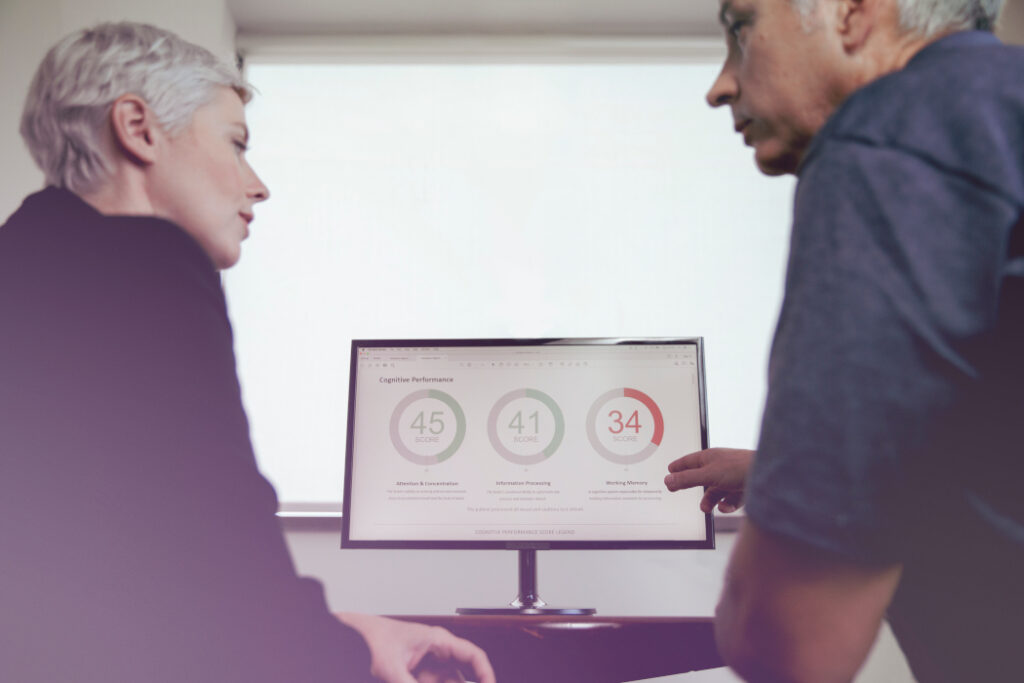Cognitive health assessments are something that a lot of people have experienced, whether you’re a professional athlete or weekend warrior who has suffered a potential brain injury, or an older person showing signs of memory loss.
These brief brain health assessments typically involve a medical professional verbally surveying a patient, asking them to draw a shape or a clock, observing their behaviour, and reaching a determination. As VoxNeuro co-founder and chief science officer John Connolly notes, it’s a “fundamentally subjective” test regularly dramatized in television programs and films.
“What John’s research has allowed us to do is to remove any and all of that subjectivity or behavioral bias that’s potentially influencing somebody’s cognitive assessment.”
“After a brain injury of any description … there is always the question that is asked by the physician or healthcare provider, ‘Can he or she hear me? Do they understand what I’m saying?’” Connolly told BetaKit in an interview. “And they still reply, ‘We don’t know.’”
Backed by over 30 years of peer-reviewed research, VoxNeuro hopes to provide an objective answer to that elusive question using software and electroencephalogram (EEG) electrodes.
Armed with $4 million CAD in fresh funding, the addition of an experienced healthtech exec in Jason Flowerday at the helm, and new clinical studies in the works with Boston University and the Canadian Armed Forces (CAF), VoxNeuro has set its sights on commercializing its software and expanding it for use in more targeted applications for concussions and Alzheimer’s disease.
The Hamilton-based healthtech startup launched its Food and Drug Administration-registered and Health Canada-cleared software platform last year. The platform assesses patients’ cognitive function based on EEG data gathered as they complete a series of neuropsychological tests on a computer.
“What John’s research has allowed us to do is to remove any and all of that subjectivity or behavioural bias that’s potentially influencing somebody’s cognitive assessment,” Flowerday, who joined VoxNeuro as CEO in March, told BetaKit in an interview. “We’re not basing it on, did [the patient] draw a good clock, what their family member said about their memory, [we’re] removing all of that … and just using scientifically-based brain biomarkers.”
VoxNeuro’s latest funding came in the form of a simple agreement for future equity (SAFE) round, which closed last month. It is an extension to the company’s previously unannounced $2 million seed round in late 2021. This capital was provided by a group of investors that includes an undisclosed family office, friends and family of VoxNeuro’s founders, and Toronto-based Klick. It brings VoxNeuro’s total venture funding to about $8 million.
VoxNeuro has also secured an additional $8 million in non-dilutive funding from a variety of sources and has another $11 million worth of grant applications outstanding. “There’s a lot of people that helped us out along the way doing the science of this,” said Connolly.
RELATED: Moozoom raises $5 million to improve youth mental health with socio-emotional learning videos
A PhD in experimental psychology, Connolly first began exploring new ways of measuring cognitive health back in the early 1990s while working as a professor at Dalhousie University. Connolly has continued this work ever since, amassing decades of peer-reviewed and patented research as he went on to serve, among other positions, as chair in cognitive neuroscience at McMaster University between 2010 and 2020.
Pressed by colleagues to turn all of this research into a business, Connolly eventually made the leap in 2017, launching VoxNeuro out of McMaster with the help of his son, James (co-founder and chief business officer) and Kimberly Elliott (co-founder and COO). Today, Connolly oversees VoxNeuro’s clinical operations and research and development efforts.
VoxNeuro’s Cognitive Health Assessment Management Platform, CHAMP, is a culmination of some of his work. CHAMP provides clinicians with a quantitative assessment of patients’ key cognitive functions like attention and concentration, information processing, and working memory, scoring them against a normative database and generating a report.
Brain cells communicate via electrical impulses, and an EEG is a test that uses electrodes—small, metal discs attached to a patient’s scalp—to measure electrical activity in the brain.
RELATED: Lucid closes $3 million to turn music into medicine for Alzheimer’s patients
CHAMP requires a 30-minute, non-invasive EEG test. By leveraging software and EEG technology, VoxNeuro hopes to improve clinical decision-making and bring more objectivity to the cognitive health assessment process.
Flowerday took the reins as VoxNeuro CEO in March. Prior to joining VoxNeuro, he served as CEO of Pro Bono Bio, Telo Genomics, and MDBriefCase—joining Think Research after the MDBriefCase was acquired in 2021. Before that, he founded and served as chief commercial officer at Orphan Canada, which sold its core assets to Knight Therapeutics eight years ago.
Flowerday noted that the extension comes amid a tough fundraising market as broader economic conditions have worsened. “I think we’re really pleased that we decided to maybe raise a little bit more than we expected, given where things have gone and [that] we don’t know when that next raise will come in,” he added.
“We thought, let’s create a bit of a buffer and a runway here where we don’t have to go asking for funding again before we hit some major milestones,” said Flowerday, who claimed that VoxNeuro’s first-generation product will be able to reach cash flow breakeven and profitability within the next year and a half.
Flowerday said half of VoxNeuro’s focus going forward will be on commercialization in the United States (US), while the remainder is being directed toward innovation and product development.
“We have the opportunity and a strong relationship with the FDA to be able to take our current product further and give it more specific indications of use,” said Flowerday, identifying concussion and Alzheimer’s disease detection as two areas on VoxNeuro’s radar where there is a significant unmet need and a strong scientific basis for the startup’s cognitive assessments.
Within the cognitive health assessment space, VoxNeuro faces an array of competitors, from traditional neuropsychological evaluations to the dozens of brain health-focused mobile apps that exist. “There are probably no less than 30 or 40 iPhone and Android-based applications, but there’s a complete absence of any science around [them],” said Flowerday, who noted that there is a smaller subset of credible competition with scientific merit trying to address the same issue as VoxNeuro.
This group includes Philadelphia’s InfraScan, which focuses specifically on diagnosing brain hematomas with its handheld devices, and Houston-based BrainCheck, which like VoxNeuro has its sights on cognitive health assessments and improving concussion and dementia diagnosis.
VoxNeuro plans to expand its software for use in more targeted applications for concussions and Alzheimer’s disease.
Compared to other players in this particular segment, the CEO said VoxNeuro differentiates itself in two key ways. First, the company has made its software agnostic to EEG, which enables VoxNeuro to work with a variety of different EEG manufacturers. The second, says Flowerday, is VoxNeuro’s approach of ensuring its offering fits neatly into clinicians’ existing workflows by, for instance, working only with EEG makers that deploy “elegant,” non-invasive solutions.
Flowerday also believes VoxNeuro has built a strong moat around itself by patenting its research. “Our IP is the combination of running a neuropsychological assessment while conducting an EEG analysis and gathering an event-related potential,” he said. “There is nobody else that can touch that space.”
While today, VoxNeuro can help measure patients’ current cognitive health, Flowerday and Connolly ultimately hope to build the startup into a tool for determining the direction of one’s cognitive health.
“What we want to be able to do is provide an assessment today to individuals that will have the power, through a large enough database and the predictive capabilities, to determine, where that individual’s cognition [is] heading,” said Flowerday.
Feature image courtesy VoxNeuro.



